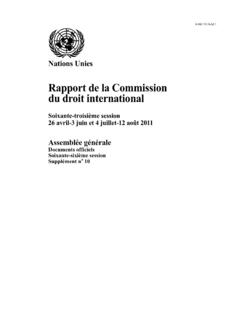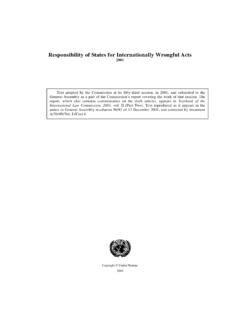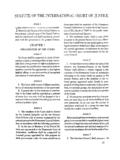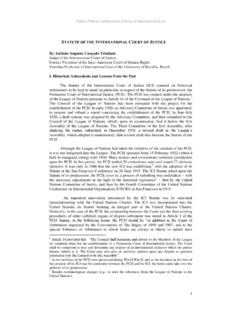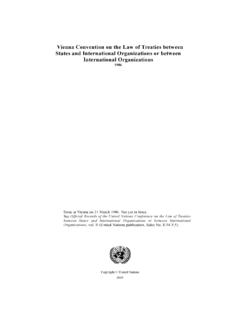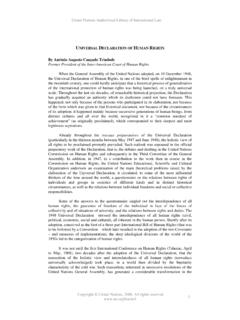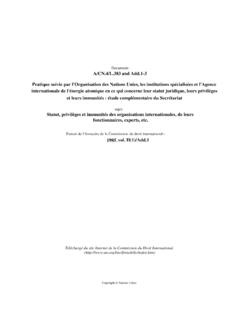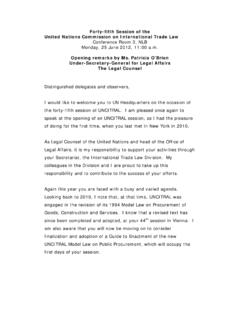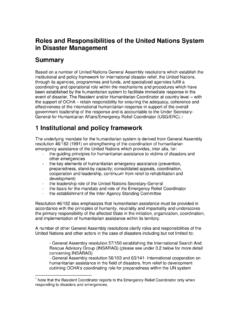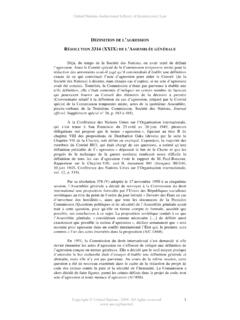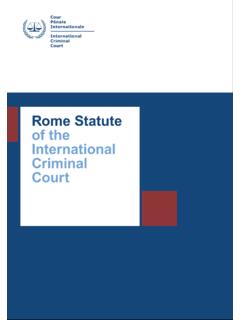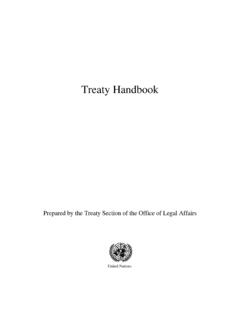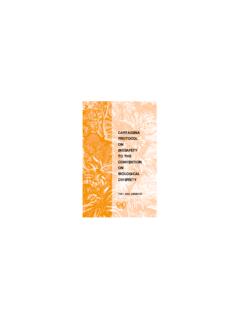Transcription of Chapter V Peremptory norms of general international law ...
1 A/74/10 141 Chapter V Peremptory norms of general international law ( jus cogens ) A. Introduction 46. At its sixty-seventh session (2015), the Commission decided to include the topic jus cogens in its programme of work and appointed Mr. Dire Tladi as Special Rapporteur for the The general Assembly subsequently, in its resolution 70/236 of 23 December 2015, took note of the decision of the Commission to include the topic in its programme of work. 47. The Special Rapporteur submitted three reports from 2016 to 2018, which the Commission considered at its sixty-eighth to seventieth sessions (2016 2018),691 respectively. Following the debates on those reports, the Commission decided to refer the draft conclusions contained in those reports to the Drafting Committee. The Commission heard interim reports from the Chairpersons of the Drafting Committee on Peremptory norms of general international law ( jus cogens ) containing the draft conclusions provisionally adopted by the Drafting Committee at the sixty-eighth to seventieth sessions, respectively.
2 48. At its sixty-ninth session (2017), following a proposal by the Special Rapporteur in his second report,692 the Commission decided to change the title of the topic from jus cogens to Peremptory norms of general international law ( jus cogens ) .693 B. Consideration of the topic at the present session 49. At the present session, the Commission had before it the fourth report of the Special Rapporteur ( ). The fourth report discussed the previous consideration of the topic in the Commission and the Sixth Committee of the general Assembly. It also addressed the questions of regional jus cogens and the inclusion of an illustrative list of Peremptory norms of general international ( jus cogens ) in the draft conclusions. On the basis of his analysis, the Special Rapporteur proposed one draft conclusion containing a non-exhaustive list of Peremptory norms of general international law ( jus cogens ).
3 50. The Commission considered the fourth report at its 3459th to 3463rd, and 3465th meetings, from 8 to 10 May, and from 14 to 16 May 2019. 51. At its 3465th meeting, on 16 May 2019, the Commission referred draft conclusion 24, as contained in the Special Rapporteur s fourth report, to the Drafting Committee on the understanding that the list contained in the draft conclusion would be moved to an annex and that it would be limited to those Peremptory norms of general international law ( jus cogens ) that the Commission had previously referred to. 52. The Commission considered the report of the Drafting Committee ( ) at its 3472nd meeting, held on 31 May 2019, and adopted the draft conclusions on Peremptory norms of general international law ( jus cogens ) on first reading (see section below). 53. At its 3499th to 3504th meetings, from 5 to 7 August 2019, the Commission adopted the commentaries to the aforementioned draft conclusions (see section below).
4 690 At its 3257th meeting, on 27 May 2015 (Official Records of the general Assembly, Seventieth Session, Supplement No. 10 (A/70/10), para. 286). The topic had been included in the long-term programme of work of the Commission during its sixty-sixth session (2014), on the basis of the proposal contained in the annex to the report of the Commission (ibid., Sixty-ninth Session, Supplement No. 10 (A/69/10), para. 23). 691 (first report), (second report) and and (third report). 692 , para. 90. 693 Official Records of the general Assembly, Seventy-second Session, Supplement No. 10 (A/72/10), para. 146). A/74/10 142 54. At its 3504th meeting, on 7 August 2019, the Commission decided, in accordance with articles 16 to 21 of its statute, to transmit the draft conclusions (see section C below), through the Secretary- general , to Governments for comments and observations, with the request that such comments and observations be submitted to the Secretary- general by 1 December 2020.
5 55. At its 3504th meeting, on 7 August 2019, the Commission further expressed its deep appreciation for the outstanding contribution of the Special Rapporteur, Mr. Dire Tladi, which had enabled the Commission to bring to a successful conclusion its first reading of the draft conclusions on Peremptory norms of general international law ( jus cogens ). C. Text of the draft conclusions on Peremptory norms of general international law ( jus cogens ), adopted by the Commission on first reading 1. Text of the draft conclusions 56. The text of the draft conclusions adopted by the Commission on first reading is reproduced below. Peremptory norms of general international law ( jus cogens ) Part One Introduction Conclusion 1 Scope The present draft conclusions concern the identification and legal consequences of Peremptory norms of general international law ( jus cogens ). Conclusion 2 Definition of a Peremptory norm of general international law ( jus cogens ) A Peremptory norm of general international law ( jus cogens ) is a norm accepted and recognized by the international community of States as a whole as a norm from which no derogation is permitted and which can be modified only by a subsequent norm of general international law having the same character.
6 Conclusion 3 general nature of Peremptory norms of general international law ( jus cogens ) Peremptory norms of general international law ( jus cogens ) reflect and protect fundamental values of the international community, are hierarchically superior to other rules of international law and are universally applicable. Part Two Identification of Peremptory norms of general international law ( jus cogens ) Conclusion 4 Criteria for the identification of a Peremptory norm of general international law ( jus cogens ) To identify a Peremptory norm of general international law ( jus cogens ), it is necessary to establish that the norm in question meets the following criteria: (a) it is a norm of general international law; and (b) it is accepted and recognized by the international community of States as a whole as a norm from which no derogation is permitted and which can be modified only by a subsequent norm of general international law having the same character.
7 A/74/10 143 Conclusion 5 Bases for Peremptory norms of general international law ( jus cogens ) 1. Customary international law is the most common basis for Peremptory norms of general international law ( jus cogens ). 2. Treaty provisions and general principles of law may also serve as bases for Peremptory norms of general international law ( jus cogens ). Conclusion 6 Acceptance and recognition 1. The requirement of acceptance and recognition as a criterion for identifying a Peremptory norm of general international law ( jus cogens ) is distinct from acceptance and recognition as a norm of general international law. 2. To identify a norm as a Peremptory norm of general international law ( jus cogens ), there must be evidence that such a norm is accepted and recognized as one from which no derogation is permitted and which can only be modified by a subsequent norm of general international law having the same character.
8 Conclusion 7 international community of States as a whole 1. It is the acceptance and recognition by the international community of States as a whole that is relevant for the identification of Peremptory norms of general international law ( jus cogens ). 2. Acceptance and recognition by a very large majority of States is required for the identification of a norm as a Peremptory norm of general international law ( jus cogens ); acceptance and recognition by all States is not required. 3. While the positions of other actors may be relevant in providing context and for assessing acceptance and recognition by the international community of States as a whole, these positions cannot, in and of themselves, form part of such acceptance and recognition. Conclusion 8 Evidence of acceptance and recognition 1. Evidence of acceptance and recognition that a norm of general international law is a Peremptory norm ( jus cogens ) may take a wide range of forms.
9 2. Such forms of evidence include, but are not limited to: public statements made on behalf of States; official publications; government legal opinions; diplomatic correspondence; legislative and administrative acts; decisions of national courts; treaty provisions; and resolutions adopted by an international organization or at an intergovernmental conference. Conclusion 9 Subsidiary means for the determination of the Peremptory character of norms of general international law 1. Decisions of international courts and tribunals, in particular of the international Court of Justice, are a subsidiary means for determining the Peremptory character of norms of general international law. 2. The works of expert bodies established by States or international organizations and the teachings of the most highly qualified publicists of the various nations may also serve as subsidiary means for determining the Peremptory character of norms of general international law.
10 Part Three legal consequences of Peremptory norms of general international law ( jus cogens ) A/74/10 144 Conclusion 10 Treaties conflicting with a Peremptory norm of general international law ( jus cogens ) 1. A treaty is void if, at the time of its conclusion, it conflicts with a Peremptory norm of general international law ( jus cogens ). The provisions of such a treaty have no legal force. 2. If a new Peremptory norm of general international law ( jus cogens ) emerges, any existing treaty which is in conflict with that norm becomes void and terminates. The parties to such a treaty are released from any obligation further to perform the treaty. Conclusion 11 Separability of treaty provisions conflicting with a Peremptory norm of general international law ( jus cogens ) 1. A treaty which, at the time of its conclusion, conflicts with a Peremptory norm of general international law ( jus cogens ) is void in whole, and no separation of the provisions of the treaty is permitted.
